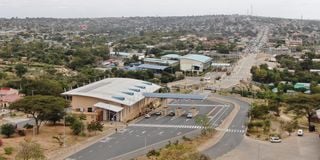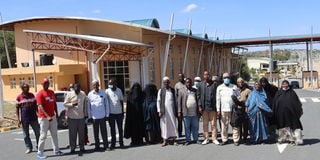The Common Market for Eastern and Southern Africa (Comesa) says it is committed to removing cross-border trade barriers to help Ethiopia and Kenya expand business opportunities.
Speaking to Nation.Africa on phone, Ministry of Foreign Affairs and International Trade, (Comesa Focal Point) assistant director Brahma Kaleve also decried neighbouring Ethiopia’s slow pace in embracing change.
“We have elaborate framework and plans that will fully enhance cross-border trade, especially among small-scale traders in Kenya and Ethiopia should we be able to overcome the few existing hurdles but we are very optimistic that we will soon surmount them,” Mr Kaleve said.
He was reacting to the despair among local authorities and traders along the Kenya-Ethiopia border in Moyale over what they termed cumbersome trade procedures imposed by the Ethiopian authorities.
Kenya is persistent and has always expressed willingness to deploy efforts toward revitalising relations with the Ethiopian government to translate to tangible socio-economic benefits for both countries.
During a spot check visit to the Moyale One-Stop Border Post (OSBP), the Nation.Africa learned that about 40 trailers full of goods were stuck at the Kenyan customs offices for nearly a week following a stalemate between the authorities from both sides over how inspection of the goods ought to be done before they got offloaded in the Kenyan stores.
Ethiopian authorities were also hesitant to allow their traders to use the Moyale OSBP, a move that posed serious uncertainty to the state-of-art facility.
Mr Kaleve admitted that the bilateral trade between Kenya and Ethiopia was facing hiccups but reiterated that plans were on to ease the barriers.
On March 1 to March 4, Ethiopia and Kenya officials attended a bilateral trade meeting at Abuya Palace in Moyale, Kenya overseen by Comesa where they developed a framework agreement.
The bilateral meeting between the Federal Democratic Republic of Ethiopia and the Republic of Kenya was aimed at negotiating and agreeing on the common list of goods to be traded under the Simplified Trade Regime (STR).
The specific objectives were also to review the draft STR agreement and negotiate to produce a common text in readiness for both Kenya and Ethiopia to append their signatures to develop a common ground for both sides.

Aerial view of Moyale One Stop Border Point. COMESA has announced plans to modernize the facility to boost its full operations.
Photo credit: Jacob Walter I Nation Media Group
The common agreement was to help in the review of border-specific plans to address challenges faced at the border concerning trade facilitation and human mobility.
Ethiopia signed a sub-delegation agreement in February 2021 for Moyale and Galafi borders.
The agreement was aimed at facilitating the implementation of the COMESA STR and other related trade facilitation instruments aimed at bolstering cross-border and Comesa intra-regional trade.
During a capacity building workshop on Comesa and European Development Finance Institutions (EDF) procedures and project implementation conducted for Ethiopia from March 23 to March 26,2021 saw Ethiopia sign the agreement.
Djibouti also signed the sub-delegation on July 27, 2021, leading to the official launch of the Galafi border upgrade project following a capacity-building workshop on Comesa and EDF procedures and project implementation.
Though Kenya was still yet to sign the sub-delegation agreement due to the slow procedural processes involved in getting ratification from the National Treasury and Attorney General.
For Kenya to sign the sub-delegation agreement it has to complete all the formalities that involve the signing of the agreement by the coordinating ministry.
The signing of the sub-delegation would see Kenya receive Sh300 million in funding from the European Union for the modernization of the Moyale One Stop Border Point.
The modernization process will include the construction of automatic gates to do away with the current tedious and slow manual verification processes at the OSBP.

Moyale Business community during an interview with the Nation a the One Stop Border Point.. They expressed concerns over hurdles imposed by the neighbouring Ethiopian authorities hampering trade.
Photo credit: Jacob Walter I Nation Media Group
Comesa is undertaking a data collection exercise to monitor if the OSBP was operating optimally and the best ways to help completely overhaul the current operations to ensure the realisation of the much-needed dividends.
Mr Kaleve also revealed that Comesa was working on modalities that will see the implementation of an exclusive roadmap to eliminate undesignated routes, use state-of-art scanners, boost revenue generation and collection, and bolster small-scale trade between Ethiopia and Kenya.
Comesa also set up an information desk at the Moyale OSBP to facilitate awareness creation among the local traders.
Ethiopia and Eritrea has since received Sh300 million from the EU.
Regional States such as Burundi, DR Congo, Kenya, Malawi, Rwanda, Uganda, Zambia, and Zimbabwe are already implementing the STR.
During the March 2022 meeting, the talks hit a snag as the Ethiopian authorities maintained a hardliner stance over the limit of trips to be made by traders from both Kenya and Ethiopia in their countries.
Ethiopian authorities maintained that traders should not make trips exceeding US 2,000 dollars per day and should not traverse more than 100 km per trip.
The Ethiopian authorities also proposed that any foreigner purchasing goods in their country using US dollars had to convert the remaining balance into Ethiopian Birr in their local banks.
The proposals did not go well with their Kenyan counterparts leading to the current impasses experienced at the Moyale-Ethiopia OSBP.
He however insisted that they were about to give up yet since not all types of levers and persuasive techniques had been exhausted to see the two partnering countries completely agree to trade under the COMESA Simplified Trade Regime (STR).
Similar sentiments were held by the Comesa Trade Information Desk Officer at the Moyale OSBP who also doubles as the KNCCI Moyale branch Director Ahmed Ali revealed that they were committed to ironing grey areas that constantly brought the two nations at loggerheads.
Mr Ali appealed to the key stakeholders to help iron out the existing stalemates between Ethiopia and Kenya to give them the impetus for implementing STR as agreed in the awareness creation meetings on July 28-29 June 2021 in Ethiopia and March 1-4,2022 in Kenya.
He explained that Comesa launched the STR in 2010 to aid in the simplification and streamlining of the documentation and procedure for the clearance of small cross-border traders’ consignments to aid them to benefit from Comesa’s preferential tariffs trading environment.
Ethiopia and Kenya also entered a bilateral agreement on a Common List of products to be traded under the Comesa Simplified Trade Regime (STR).
The Common Lists of traded products, agreement of the STR threshold, and application of other instruments such as sanitary and phyto-sanitary measures are important for the effective implementation of the trade regime.
The STR was launched in 2010, to enable small-scale traders to benefit from Comesa’s trade liberalisation program by simplifying and formalizing the trade.
The meeting was part of the implementation of a 15 million euros Cross-Border Trade Initiative, financed by the European Union under the 11th European Development Fund (EDF).
Its objective was to facilitate small-scale cross-border trade among the targeted countries.
Experts observed that the effective implementation of the STR spurs growth and enhances production and productivity of the agricultural sectors through value addition and processing thereby creating jobs and increasing household incomes.
The simplification and formalisation of cross-border trade were also aimed at helping the region empower women and youths, who make up 70 percent of the traders.
The two countries also signed and ratified the African Continental Free Trade Area (AfCFTA), thus opening the way for preferential treatment to be accorded to one another.
The Director encouraged the two countries to remove existing barriers to cross-border trade to expand opportunities for business people.
Moyale Deputy County Commissioner Stanley Too related how a series of joint meetings geared towards the promotion of cross-border cooperation, foreign affairs, trade and industry, and trans-border resource sharing had been conducted barely a month now.
“It is just a shy of a month ago, we convened a series of bilateral meetings involving traders from both Kenya and Ethiopia and later joint-board meeting with the Ethiopian administration in the spirit of searching for a common ground and bolstering our ties, our neighbors have instead continued to maintain their status quo of no cooperation,” Mr Too told the Nation in his office.
He expressed disappointment with how their counterparts in neighboring Ethiopia were slow to embrace the proposed changes.
He appealed to both sides to show genuine commitment to boosting bilateral trade and relations between them saying that there were immense benefits and low-lying fruits in the free trade areas in the region.
In 2021, the Nation.Africa covered a high-powered meeting convened by Trademark Africa that was deemed that would mark a critical milestone in strengthening bilateral relations and a step forward in enhancing cross-bordering trade and the free movement of people.
The series of meetings culminated in the sealing of a deal for a free trade area between Ethiopia and Kenya in Addis Ababa, an act that was projected to make cross-border business dealings easier.
The signing of an operational guiding document, the Moyale One Stop Border Post Procedure Manual, was also anticipated to give the neighboring countries a competitive edge regarding goods traded.
The deal also encouraged small-scale traders by developing a simplified framework to facilitate their business activities at the border.
However, since then not much progress been made instead the relations between the two nations have continued to grow sour.
Mr Too has been left wondering about the remaining type of levers or the persuasive techniques that can be exhausted to see the two partnering countries completely agree to trade under the Comesa Simplified Trade Regime (STR).

